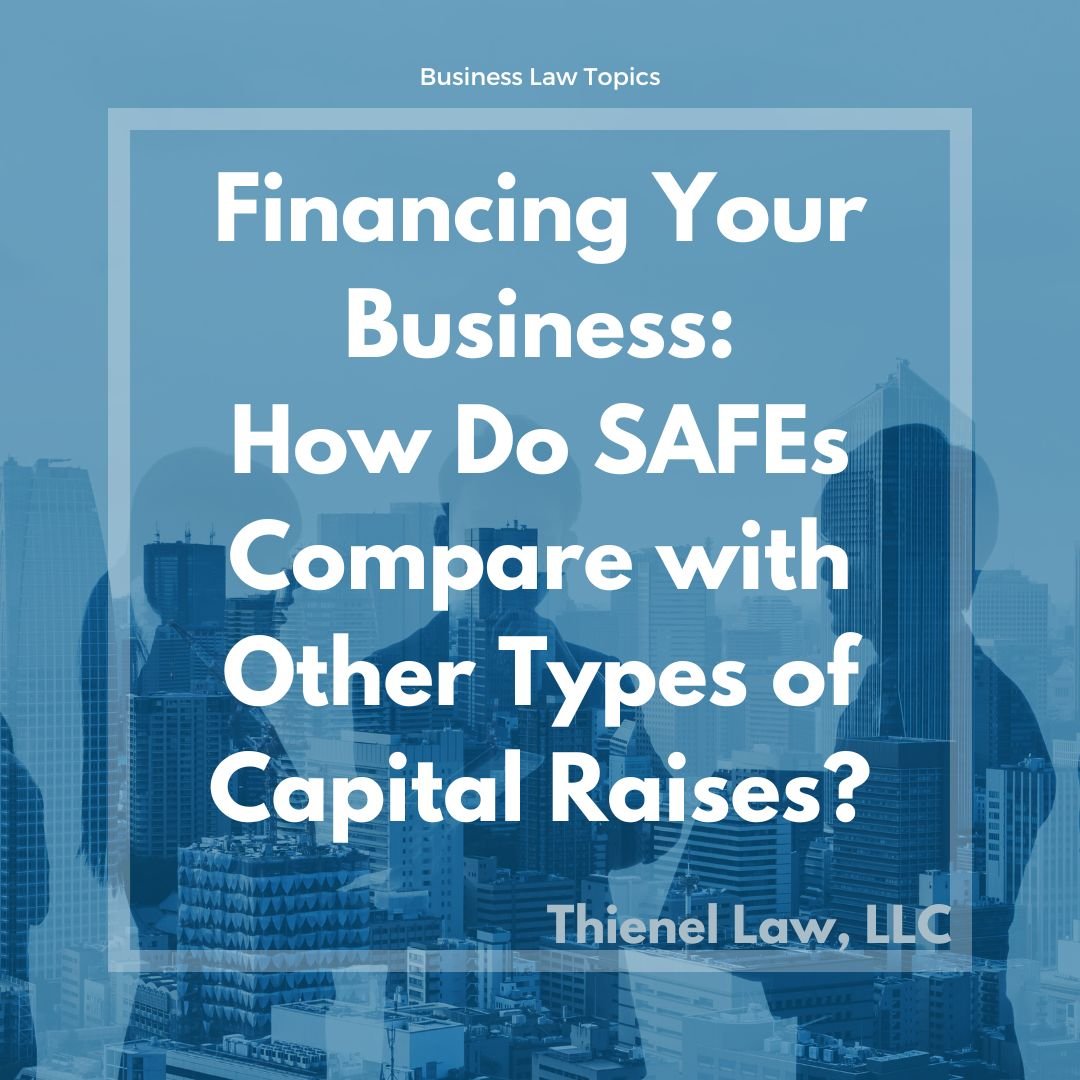Financing Your Business: How Do SAFEs Compare with Other Types of Capital Raises?
Financing your business might seem overwhelming. You cannot grow your startup company without funds. However, what is the best way to finance your business while protecting your company and your personal assets? Our Maryland business lawyer explains SAFEs in greater detail and how they compare to other ways to raise money for your startup.
What Is a SAFE Agreement?
Startups are difficult to value until they begin generate business and profits. However, they need initial capital or “seed-round funding” to move the business from an idea to a profit-generating company. Entrepreneurs often use traditional methods to obtain early-stage investments, such as convertible notes, loans, and equity transfers. SAFEs can be a reliable alternative to traditional early-stage funding options.
A Simple Agreement for Future Equity (SAFE) is a contract a business uses to attract investors and venture capitalists in the early stage of financing a business. The contracts are legally binding in Maryland when written and executed according to Maryland contract law.
A business owner and investor sign a SAFE agreement. The investor agrees to provide seed-round funding for the startup. The goal is for the company to grow and raise additional capital, thereby increasing the company’s value. A SAFE agreement is a way for an investor to purchase the right to future equity in the company when the company is worth more money. If the company does well, the investor receives high-value shares in the startup, including valuation caps and discounts.
What Are the Differences Between SAFEs, Convertible Notes, and Loans?
It is important to note that SAFEs are not traditional forms of funding or investing in startups. So let’s review some of the essential differences between SAFEs and other types of capital raises.
No Interest on Funds from SAFE Agreements
A SAFE is not a debt instrument and does not accrue interest like a traditional loan or convertible note. The interest rate for notes and convertible notes are negotiated between the parties.
The Term of the Agreement
Unlike traditional loans and convertible notes, SAFE agreements do not have a maturity date. Instead, the contract contains various events that trigger the investor’s right to convert their investment into equity or reclaim their initial investment.
Loans and convertible notes contain terms and conditions that define when the debt must be repaid. For example, a loan agreement has the repayment schedule or term of the loan. A convertible note typically has a maturity date that specifies when the debt must be repaid in full.
The Complexity of the Agreement
A SAFE agreement is generally a short contract with fixed terms and conditions. There are few terms to negotiate. The result is a simple, less comprehensive contract than a traditional loan or note agreement. SAFEs are becoming more popular with startups because entrepreneurs can secure the agreements with little legal background for quick capital to grow their company. However, rushing into a SAFE agreement without legal counsel could severely limit your choices, flexibility, and company control in the future.
On the other hand, convertible notes and loan agreements contain many terms and conditions that the parties may negotiate. As a result, the agreements are lengthy because they must cover all conditions, terms, and rights of each party. In addition, the parties may continue to add conditions, stipulations, and terms to the agreement. Typically, these agreements are incredibly complex by the time the parties complete negotiations.
Final Thoughts for SAFEs vs. Traditional Startup Funding
Most people consider SAFEs a “water-downed” version of a convertible note instead of something that resembles a loan. The convertible note and the SAFE can be converted into company shares at some point. However, the SAFE is not a debt and need not be reported on the company’s balance sheet. In addition, the SAFE does not have maturity dates, which can make them more desirable for many startups.
SAFEs are relatively new. Even though they are simple, cost-effective, and streamline obtaining investors for a startup, SAFEs may not be the best way to obtain funding for every new business. When choosing ways to raise capital, you need to consider several factors, including the size of the investment, your goals, and the type of business you own.
Discuss SAFEs in more detail with a Maryland business lawyer before signing an agreement that the other party can enforce in court. Having sound legal advice is always in your best interest before signing a business contract.
Contact a Maryland Business Lawyer for More Information
Choosing a financing strategy for your business can impact future business plans. Contact our Maryland business attorney to compare your financing options to choose the best option for your company.


